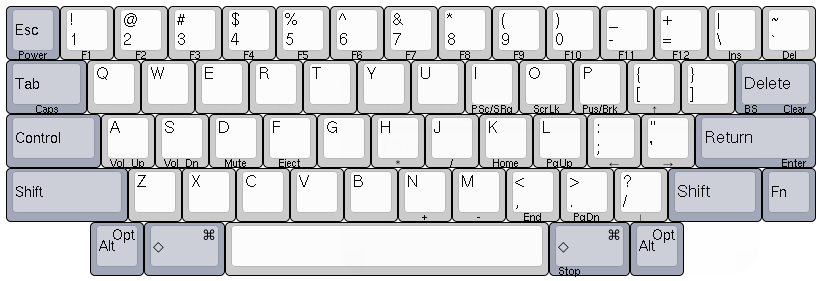HHKB Professional2
| This article requires photographic illustration |
| Manufacturer | PFU |
|---|---|
| Product family | Happy Hacking Keyboard |
| Features | USB hub |
| Layouts | 60 (Modified US ANSI) |
| Keyswitches | Topre |
| Interface | USB |
| Weight | 530g |
| Years of production | 2006 - current |
| Price | $300+ |
Happy Hacking Keyboard Professional2 (HHKB Pro2) is Happy Hacking Keyboard Professional with USB hub.
Contents
Description
The Happy Hacking Keyboard (stylised as HHKB) Professional2 keyboard goes back to Dr. Wada's keyboard layout, however it adds USB hubs on the back of Happy Hacking Keyboard for added convenience along with EU directive compliance for environmental standards (complies with RoHS).
The HHKB Professional2 is priced at ¥24,990 and on sale since March 24, 2006.[1]
The keyboard is also for sale on the EliteKeyboards website. Buyers and potential owners of HHKB Pro2 bought from US will have their manufacturer warranties honoured should they reside in US.
DIP Switch configuration
EliteKeyboards' website has kindly offered an overview of most DIP switch configurations available and the results when they are switched either ON or OFF respectively. Here is an example.
Japanese users can view the DIP switch configuration from the manufacturer website (Japanese only).
The basic layout of the HHKB Professional2 can be viewed as such:
Raw data for use with http://www.keyboard-layout-editor.com website (copy and paste the codes into the Raw data part):
{backcolor:"#ffffff"},
[{y:1.5,c:"#a2a8b8",f:4},"\n\n\n\nPower\n\nEsc",{c:"#cccccc",f:5},"!\n1\n\n\nF1","@\n2\n\n\nF2","#\n3\n\n\nF3","$\n4\n\n\nF4","%\n5\n\n\nF5","^\n6\n\n\nF6","&\n7\n\n\nF7","*\n8\n\n\nF8","(\n9\n\n\nF9",")\n0\n\n\nF10","_\n-\n\n\nF11","+\n=\n\n\nF12","|\n\\\n\n\nIns",{f:4},"~\n`\n\n\nDel"],[{c:"#a2a8b8",w:1.5},"\n\n\n\nCaps\n\nTab",{c:"#cccccc",f:5},"Q","W","E","R","T","Y","U",{a:0},"I\n\n\n\nPSc/\nSRq",{a:4},"O\n\n\n\nScrLk","P\n\n\n\nPus/Brk","{\n[\n\n\n↑","}\n]",{c:"#a2a8b8",a:0,w:1.5},"\n\n\n\nBS\nClear\nDelete"],[{a:4,f:4,w:1.75},"\n\n\n\n\n\nControl",{c:"#cccccc",f:5},"A\n\n\n\nVol_Up","S\n\n\n\nVol_Dn","D\n\n\n\nMute","F\n\n\n\nEject","G","H\n\n\n\n*","J\n\n\n\n/","K\n\n\n\nHome","L\n\n\n\nPgUp",":\n;\n\n\n←","\"\n'\n\n\n→",{c:"#a2a8b8",a:0,w:2.25},"\n\n\n\n\nEnter\nReturn"],[{a:4,f:4,w:2.25},"\n\n\n\n\n\nShift",{c:"#cccccc",f:5},"Z","X","C","V","B","N\n\n\n\n+","M\n\n\n\n-","<\n,\n\n\nEnd",">\n.\n\n\nPgDn","?\n/\n\n\n↓",{c:"#a2a8b8",w:1.75},"\n\n\n\n\n\nShift",{f:4},"\n\n\n\n\n\nFn"],[{x:1.55},"\n\nOpt\n\n\n\nAlt",{w:1.5},"\n\n⌘\n\n\n\n◇",{c:"#cccccc",f:5,w:6},"",{c:"#a2a8b8",a:0,f:4,w:1.5},"\n\n⌘\n\nStop\n\n◇",{a:4},"\n\nOpt\n\n\n\nAlt"]
For the remaining images for DIP switch configurations various details has been omitted for simplicity sake, these include but are not limited to:
- Alphanumeric keys are not labelled.
- Most of the modifier keys (such as Control, Alt, Shift, etc) are not labelled unless there is a change in the mode.
- Fn key will always be labelled as DIP switch configuration, it mostly affects key mappings on the Fn layer.
- Certain side-printed legends will not be labelled as they do not also emit such functionality under specific mode(s).
- Any key(s) labelled as side-printed legends will remain only accessible via the Fn layer under the specific mode(s).
In HHK mode the layout looks something like this:
Raw data for use with http://www.keyboard-layout-editor.com website (copy and paste the codes into the Raw data part):
{backcolor:"#ffffff"},
[{y:1.5,c:"#a2a8b8",f:4},"",{c:"#cccccc",f:5},"\n\n\n\nF1","\n\n\n\nF2","\n\n\n\nF3","\n\n\n\nF4","\n\n\n\nF5","\n\n\n\nF6","\n\n\n\nF7","\n\n\n\nF8","\n\n\n\nF9","\n\n\n\nF10","\n\n\n\nF11","\n\n\n\nF12","\n\n\n\nIns",{f:4},"\n\n\n\nDel"],[{c:"#a2a8b8",w:1.5},"",{c:"#cccccc",f:5},"","",{a:0},"","",{a:4},"","","",{a:0},"\n\n\n\nPSc/\nSRq",{a:4},"\n\n\n\nScrLk","\n\n\n\nPus/Brk","\n\n\n\n↑","",{c:"#a2a8b8",a:0,w:1.5},"\n\n\n\nBS\n\nDelete"],[{a:4,f:4,w:1.75},"",{c:"#cccccc",f:5},"","","","","","","","\n\n\n\nHome","\n\n\n\nPgUp","\n\n\n\n←","\n\n\n\n→",{c:"#a2a8b8",a:0,w:2.25},"\n\n\n\n\n\nReturn"],[{a:4,f:4,w:2.25},"",{c:"#cccccc",f:5},"",{a:0},"","",{a:4},"","","","","\n\n\n\nEnd","\n\n\n\nPgDn","\n\n\n\n↓",{c:"#a2a8b8",w:1.75},"",{f:4},"\n\n\n\n\n\nFn"],[{x:1.55},"",{w:1.5},"",{c:"#cccccc",f:5,w:6},"",{c:"#a2a8b8",a:0,f:4,w:1.5},"\n\n\n\nStop",{a:4},""]
However, according to switchy (of #MechBoards channel on Freenode network IRC) HHK mode emits different keycode under *nix for instance which resolves to this layout:
The layout above with the two logo on where the Super/Command lies (keys on the either sides of spacebar) are muhenkan and henkan respectively. The function of these weird keycodes are mainly reserved for Japanese character inputs. The logos are copied off HHKB Professional JP for illustrative purposes.
In Lite mode the layout looks like this:
Raw data for use with http://www.keyboard-layout-editor.com website (copy and paste the codes into the Raw data part):
{backcolor:"#ffffff"},
[{y:1.5,c:"#a2a8b8",f:4},"",{c:"#cccccc",f:5},"\n\n\n\nF1","\n\n\n\nF2","\n\n\n\nF3","\n\n\n\nF4","\n\n\n\nF5","\n\n\n\nF6","\n\n\n\nF7","\n\n\n\nF8","\n\n\n\nF9","\n\n\n\nF10","\n\n\n\nF11","\n\n\n\nF12","\n\n\n\nIns",{f:4},"\n\n\n\nDel"],[{c:"#a2a8b8",w:1.5},"\n\n\n\nCaps",{c:"#cccccc",f:5},"","",{a:0},"","",{a:4},"","","",{a:0},"\n\n\n\nPSc/\nSRq",{a:4},"\n\n\n\nScrLk","\n\n\n\nPus/Brk","\n\n\n\n↑","",{c:"#a2a8b8",a:0,w:1.5},"\n\n\n\nBS\n\nDelete"],[{a:4,f:4,w:1.75},"",{c:"#cccccc",f:5},"","","","","","\n\n\n\n*","\n\n\n\n/","\n\n\n\nHome","\n\n\n\nPgUp","\n\n\n\n←","\n\n\n\n→",{c:"#a2a8b8",a:0,w:2.25},"\n\n\n\n\nEnter\nReturn"],[{a:4,f:4,w:2.25},"",{c:"#cccccc",f:5},"",{a:0},"","",{a:4},"","","\n\n\n\n+","\n\n\n\n-","\n\n\n\nEnd","\n\n\n\nPgDn","\n\n\n\n↓",{c:"#a2a8b8",w:1.75},"",{f:4},"\n\n\n\n\n\nFn"],[{x:1.55},"",{w:1.5},"\n\n⌘\n\n\n\n◇",{c:"#cccccc",f:5,w:6},"",{c:"#a2a8b8",a:0,f:4,w:1.5},"\n\n⌘\n\n\n\n◇",{a:4},""]
In Mac mode the layout looks like this:
Raw data for use with http://www.keyboard-layout-editor.com website (copy and paste the codes into the Raw data part):
{backcolor:"#ffffff"},
[{y:1.5,c:"#a2a8b8",f:4},"\n\n\n\nPower",{c:"#cccccc",f:5},"\n\n\n\nF1","\n\n\n\nF2","\n\n\n\nF3","\n\n\n\nF4","\n\n\n\nF5","\n\n\n\nF6","\n\n\n\nF7","\n\n\n\nF8","\n\n\n\nF9","\n\n\n\nF10","\n\n\n\nF11","\n\n\n\nF12","\n\n\n\nIns",{f:4},"\n\n\n\nDel"],[{c:"#a2a8b8",w:1.5},"\n\n\n\nCaps",{c:"#cccccc",f:5},"","",{a:0},"","",{a:4},"","","",{a:0},"\n\n\n\nPSc/\nSRq",{a:4},"\n\n\n\nScrLk","\n\n\n\nPus/Brk","\n\n\n\n↑","",{c:"#a2a8b8",a:0,w:1.5},"\n\n\n\n\nClear\nBS"],[{a:4,f:4,w:1.75},"",{c:"#cccccc",f:5},"\n\n\n\nVol_Dn","\n\n\n\nVol_Up","\n\n\n\nMute","\n\n\n\nEject","","\n\n\n\n*","\n\n\n\n/","\n\n\n\nHome","\n\n\n\nPgUp","\n\n\n\n←","\n\n\n\n→",{c:"#a2a8b8",a:0,w:2.25},"\n\n\n\n\nEnter\nReturn"],[{a:4,f:4,w:2.25},"",{c:"#cccccc",f:5},"",{a:0},"","",{a:4},"","","\n\n\n\n+","\n\n\n\n-","\n\n\n\nEnd","\n\n\n\nPgDn","\n\n\n\n↓",{c:"#a2a8b8",w:1.75},"",{f:4},"\n\n\n\n\n\nFn"],[{x:1.55},"",{w:1.5},"\n\n⌘\n\n\n\n◇",{c:"#cccccc",f:5,w:6},"",{c:"#a2a8b8",a:0,f:4,w:1.5},"\n\n⌘\n\n\n\n◇",{a:4},""]
As a side note to the Mac mode, one can see the following changes have been made apart from the usually reserved Mac keys:
- Delete no longer functions as Delete, instead Backspace (or 'BS') takes place.
- Clear functionality actually also functions as Num Lock key under PC.
Refer to the HHKB Professional2 Discussion page as well as HHKB Professional Discussion page for more information.
See also
- Happy Hacking Keyboard Professional series
- Happy Hacking Keyboard
- Happy Hacking Keyboard Professional2 talk page
References
- ↑ PFU website - Press release: HHKB Pro2 (Japanese only)




